National
Top 10 national news stories of 2021
Capitol insurrection, COVID cancellations, and a new president
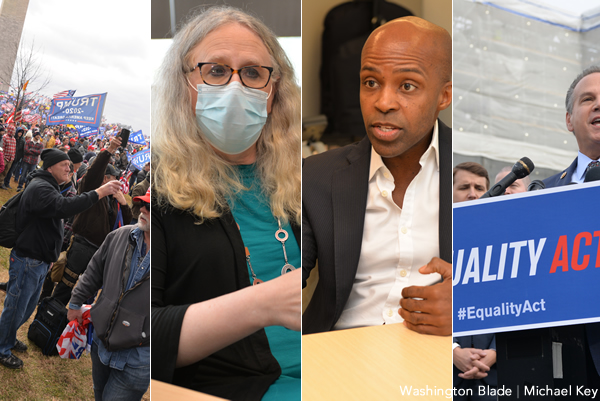
#10: RNC creates Pride outreach coalition
Republican National Committee chair Ronna McDaniel, in a video announcement at a Log Cabin Republicans dinner honoring Melania Trump and attended by former President Trump, announced the creation of the LGBTQ outreach Pride coalition — much to the consternation of internal critics.
Following calls on her to resign from anti-LGBTQ conservatives like Family Research Council’s Tony Perkins, McDaniel defended the coalition by saying it was a continuation of the LGBTQ initiative set up with Trump’s 2020 re-election campaign — which had enjoyed success by doubling the LGBTQ vote for the Republican candidate after the previous election.
McDaniel wrote an apology letter for poor communication over the creation of the new initiative, which led Democrats to criticize Republicans over the perceived backtracking on LGBTQ outreach.
#9: Caitlyn Jenner makes waves as gubernatorial candidate

Caitlyn Jenner, in a free-for-all recall election in California seeking to unseat Gov. Gavin Newsom, made waves as a Republican gubernatorial candidate, breaking new ground as a transgender candidate while facing criticism for being out of touch.
Early on in her candidacy, the former Olympic champion said she was against transgender kids in sports, citing a need to protect women in athletics. Jenner later modified her position by saying potential players who had gone through the transition process should “of course” be allowed to compete.
Jenner became an unlikely popular figure in conservative media, appearing on Fox News and Newsmax. At the end of the day, Jenner performed poorly at the polls, taking two percent of the vote as Newsom survived the recall effort.
#8: Supreme Court issues non-ruling in Fulton case
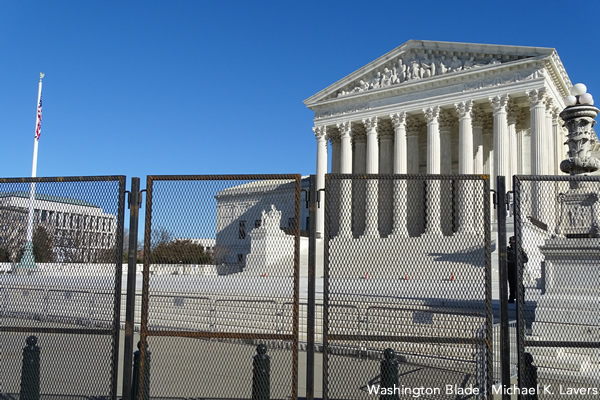
The U.S. Supreme Court, amid fears it would render a decision this year that would enable sweeping discrimination against LGBTQ people, instead handed down a ruling in Fulton v. City of Philadelphia limited to the facts of the case at hand and with no major impact.
In a unanimous ruling, justices issued a decision in favor of Catholic Social Services, which sought a First Amendment ruling to refuse child placement with same-sex couples over a religious exemption, but it was based on the approach of the City of Philadelphia enforcing its contract with the foster care agency.
Both sides claimed a small victory. The American Civil Liberties Union, which had argued before the Supreme Court in the case and sided with the City of Philadelphia, said the ruling “will not affect any foster care programs that do not have the same system for individualized exemptions that were at issue here.”
#7: In grim record, at least 46 trans people killed

In a grim milestone, at least 46 trans people were killed by the time of the Transgender Day of Remembrance, reaching a new record in the time the deaths have been recorded.
The violence has consistently had a disproportionate impact on transgender women of color. Among the deaths that brought the tally to a new record was Marquiisha “Quii” Lawrence, a 28-year-old Black transgender woman who was shot and killed in her home in Greenville, S.C.
President Biden, who had brought attention to the issue of anti-transgender violence as a presidential candidate, issued a statement recognizing the 46 deaths and was briefed on the issue in the days preceding the Transgender Day of Remembrance.
#6: HRC president fired after being ensnared in Cuomo affair
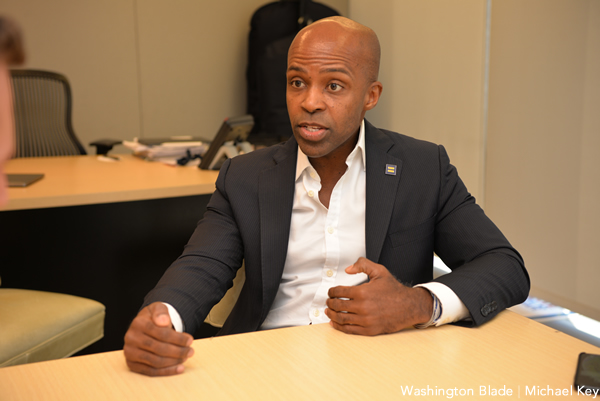
The president of the Human Rights Campaign was terminated from his role this year following a public dispute with the board after being ensnared in the damning report detailing accusations of sexual misconduct against former New York Gov. Andrew Cuomo.
Alphonso David, who had previously served as counselor to Cuomo, was revealed in the report by New York Attorney General Letitia James to have kept a personnel file of one of the female employees alleging sexual misconduct, then having assisted in efforts to leak that file to the media in an attempt to discredit her.
Although the Human Rights Campaign board initially stood by David, the organization later announced an independent review of the matter, which David said he welcomed. David took to Twitter and criticized the board for having privately asked him about resigning, which prompted his termination.
#5: Equality Act all but dead in Congress
Although LGBTQ rights advocates had hoped President Biden would be able to deliver a campaign promise to sign into law a long-sought update to federal civil rights law that would include LGBTQ people, legislation known as the Equality Act is all but dead in Congress.
The U.S. House, acting quickly on Biden’s campaign promise to sign the Equality Act into law within the first 100 days of his administration, approved the legislation in February, although it had fewer Republican votes compared to when the chamber last passed the measure.
But the Equality Act, contorted by critics who claim it endangers women’s rights and privacy, went no further in Congress. In the Senate, where Sen. Joe Manchin has declined to support the bill and Sen. Susan Collins has withdrawn her support, the legislation never got a vote — either on the floor or in committee. No route appears open for the bill.
#4: Buttigieg, Levine confirmed by Senate in historic firsts
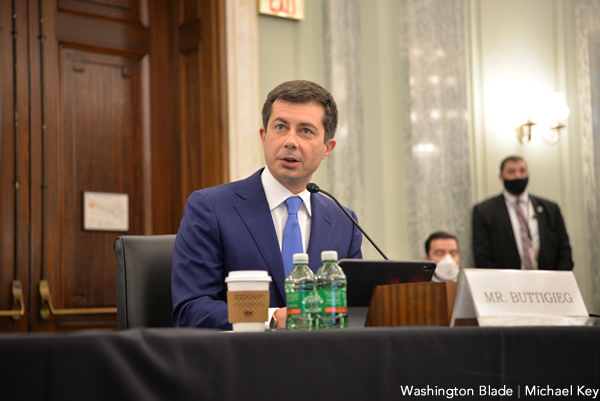
In a pair of historic votes, the U.S. Senate this year confirmed two presidential appointees — Pete Buttigieg and Rachel Levine.
Buttigieg was confirmed as transportation secretary, making him the first openly gay person to win Senate confirmation for a Cabinet-level role, while Levine was confirmed as assistant secretary for health, making her the first openly transgender person to win Senate confirmation for any position.
Although Buttigieg was confirmed with bipartisan support, that quickly faded as the supply chain crisis emerged and Buttigieg faced criticism for his approach to the issue.
For Levine, the road was different. During her confirmation hearing, Sen. Rand Paul (R-Ky.), began his inquiries with the words “genital mutilation,” which formed the basis of his rude, invasive questioning. Levine was confirmed by a narrow vote of 52-48.

#3: States enact measures against trans kids in sports, health care
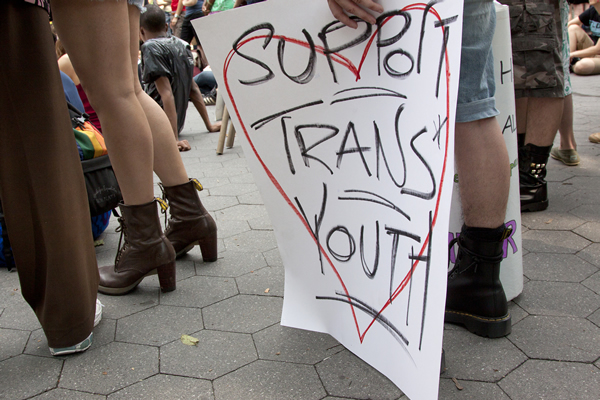
Drawing on anti-trans fears, states defied federal laws against discrimination and enacted measures against transgender kids in sports and access to health care, leading to a wave of litigation in the next battleground for the LGBTQ movement.
Among the most stringent measures was a law in Arkansas, enacted by the legislature overriding a veto of Gov. Asa Hutchinson, instituting criminal penalties for providing transition-related care to youth. Other states, including Florida, Texas, and West Virginia, enacted laws prohibiting transgender girls from participating in school sports consistent with their gender identity.
LGBTQ legal advocates were quick to file litigation against the measure in court, arguing they violate the prohibition on discrimination based on sex in schools under Title IX of the Education Amendments of 1972. Judges have blocked measures from going into effect as litigation moves forward.
#2: Coronavirus continues to rage, nixes LGBTQ events

Despite hopes the coronavirus would fade with the emergence of vaccines, the pandemic continues to rage amid breakthrough infections and refusal of a large percentage of Americans to get the shot, leading to additional deaths and cancellation of LGBTQ events.
More than 386,000 deaths due to coronavirus were reported this year, making it deadlier than the previous year in terms of sheer numbers, as hospitalization rates continued to climb to new highs.
Pride celebrations were among the events cancelled as the pandemic continued through the summer. Large cities like Los Angeles and Boston opted not to have not to have events at all, while D.C. had a much scaled-down event in which Vice President Kamala Harris participated.
#1: After insurrection, Biden inaugurated and reverses Trump anti-LGBTQ policies
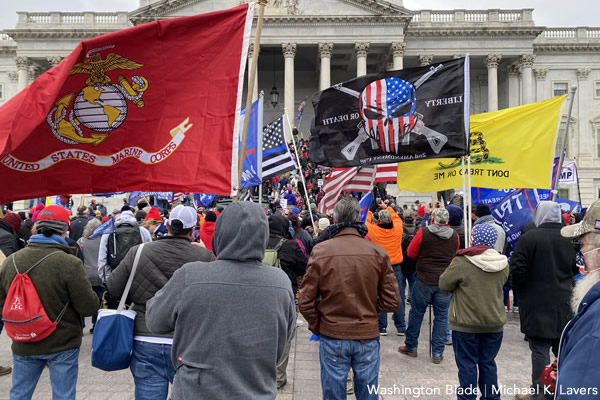
After a bloody insurrection on Jan. 6 at the U.S. Capitol incited by President Trump, Joe Biden brought with him a sense of renewal and a promise of unity after was sworn in as the 46th president of the United States, reversing anti-LGBTQ policies early on during his administration.
Biden on his first day in office signed an executive order requiring federal agencies to implement the U.S. Supreme Court’s decision against anti-LGBTQ discrimination in Bostock v. Clayton County to fullest extent possible. Days later, Biden signed an executive order reversing President Trump’s ban on transgender people serving in the military, leading to a policy that would enable transgender people for the first time ever to enlist in the armed forces.
In another reversal, Biden issued a White House proclamation to recognize Pride month after Trump failed to issue an official notice for each of his four years in office, with the exception of a solitary tweet in 2019. In the proclamation, Biden urged LGBTQ people to “accept nothing less than full equality.”
Minnesota
Reports say woman killed by ICE was part of LGBTQ community
Renee Nicole Good shot in Minneapolis on Wednesday

A U.S. Immigration and Customs Enforcement agent shot and killed a woman in Minneapolis as she attempted to drive away from law enforcement during a protest on Wednesday.
The Star Tribune newspaper identified the victim as Renee Nicole Good, 37, a Minneapolis resident who lived blocks from where she was shot in the Central neighborhood, according to reports. Donna Ganger, Good’s mother, told the Star Tribune that her daughter lived in the Twin Cities with her wife.
Multiple videos of the shooting have gone viral on social media, showing various angles of the fatal incident — including footage that shows Good getting into her car and attempting to drive away from law enforcement officers, who had their weapons drawn.
In the videos, ICE agents can be heard telling Good to “get out of the fucking car” as they attempted to arrest her. Good, who press reports say was married to a woman, ended up crashing her car into an electric pole and other vehicles. She was later transported from the scene of the shooting and died at the hospital.
President Donald Trump defended the ICE agent on Truth Social, saying the officer was “viciously” run over — a claim that coincides with Homeland Security Secretary Kristi Noem’s assessment of the situation. Noem, a South Dakota Republican, insisted the officer “fired defensive shots” at Good after she attempted to run over law enforcement agents “in an attempt to kill them — an act of domestic terrorism.”
Multiple state and local officials disputed claims that the shooting was carried out in self-defense at the same time Noem was making those assertions.
An Instagram account that appears to belong to Good describes her as a “poet and writer and wife and mom and shitty guitar strummer from Colorado; experiencing Minneapolis, MN,” accompanied by a rainbow flag emoji.
A video posted to X after the shooting shows a woman, reportedly her wife, sitting on the ground, crying and saying, “They killed my wife. I don’t know what to do.”
“We’ve dreaded this moment since the early stages of this ICE presence in Minneapolis,” Mayor Jacob Frey said during a Wednesday press conference. “Having seen the video myself, I want to tell everybody directly that [the DHS’s claim of self-defense] is bullshit. This was an agent recklessly using power that resulted in somebody dying, getting killed.”
“I have a message for ICE. To ICE, get the fuck out of Minneapolis,” Frey continued. “We do not want you here. Your stated reason for being in this city is to create some kind of safety, and you are doing exactly the opposite. People are being hurt. Families are being ripped apart. Long-term Minneapolis residents that have contributed so greatly to our city, to our culture, to our economy are being terrorized, and now somebody is dead. That’s on you, and it’s also on you to leave.”
Across the Capitol, members of the House and the Senate condemned the actions of the officer.
“There’s no indication she’s a protester, there’s nothing that at least you can see on the video, and therefore nothing that the officers on the ground could see that identify her as someone who’s set out to try to do harm to an ICE officer,” U.S. Sen. Elizabeth Warren (D-Mass.) said Wednesday night on MS NOW’s “The Weeknight.”
“There is no evidence that has been presented to justify this killing,” House Minority Leader Hakeem Jeffries (D-N.Y.) said in a statement on his website. “The masked ICE agent who pulled the trigger should be criminally investigated to the full extent of the law for acting with depraved indifference to human life.”
“ICE just killed someone in Minneapolis,” U.S. Rep. Robert Garcia (D-Calif.) the highest-ranking Democrat on the House Oversight Committee, posted on X. “This administration’s violence against communities across our country is horrific and dangerous. Oversight Democrats are demanding answers on what happened today. We need an investigation immediately.”
In a statement to the Advocate, Human Rights Campaign President Kelley Robinson wrote, “Today, a woman was senselessly killed in Minneapolis during an ICE action — a brutal reminder that this agency and the Trump regime put every community at risk, spreading fear instead of safety. Reports that she may have been part of the LGBTQ+ community underscore how often the most vulnerable pay the highest price.”
National LGBTQ Task Force President Kierra Johnson also responded to Good’s death.
“We recognize and mourn the loss of Renee Nicole Good and extend our condolences to her family, loved ones, and community,” said Johnson in a statement. “This loss of life was preventable and reprehensible, particularly coming at the hands of federal agents.”
National
U.S. in midst of ‘genocidal process against trans people’: study
Attacks rooted in Nazi ideology’s views on gender

Earlier this week, the Lemkin Institute for Genocide Prevention and Human Security issued a haunting warning. Dr. Elisa von Joeden-Forgey, president of the Lemkin Institute, stated that the U.S. is in the “early-to-mid stages of a genocidal process against trans and nonbinary and intersex people.” Dr. Gregory Santon, former president of the International Association of Genocide Scholars, flags “a hardening of categories” surrounding gender in a “totalitarian” way.
Stanton argues that this is rooted in Nazi ideology’s surrounding gender — this same regime that killed many LGBTQIA individuals in the name of a natural “binary.” As Von Joeden-Forgey said, the queer community, alongside other “minority groups, tends to be a kind of canary in the coal mine.”
In his first year in office, Trump and his Cabinet’s anti-trans rhetoric has only intensified, with a report released late September by journalist Ken Klippenstein in which national security officers leaked that the FBI is planning to classify trans people as “extremists.” By classifying trans people as “Nihilistic Violent Extremists,” far-right groups would have more “political (and media) cover,” as Abby Monteil reports for them, for anti-trans violence and legislation.
While the news is terrifying, it’s not unprecedented – the fight against trans rights and classification of trans people as violent extremists was included in Project 2025, and in the past several weeks, far-right leaders’ transphobic campaign has expanded: boycotting Netflix to pressure the platform to remove trans characters, leveraging anti-trans attack ads in the Virginia governor’s race and banning professors from acknowledging that trans people exist. In fact last month, two Republican members of Congress called for the institutionalization of trans people.
It’s a dangerous escalation of transphobic violence that the Human Rights Campaign has classified as an epidemic. According to an Everytown for Gun Safety report published in 2020, the number of trans people murdered in the U.S. almost doubled between 2017 and 2021. According to data released by the Gun Safety report from February 2024, 34 percent of gun homicides of trans, nonbinary, and gender expansive people remain unsolved.
As Tori Cooper, director of Community Engagement for the Transgender Justice Initiative for the Human Rights Campaign Foundation, this violence serves a purpose. “The hate toward transgender and gender expansive community members is fueled by disinformation, rhetoric and ideology that treats our community as political pawns ignoring the fact that we reserve the opportunity to live our lives full without fear of harm or death,” Cooper said.
“The genocidal process,” Von Joeden-Forgey said, “is really about destroying identities, destroying groups through all sorts of means.” And just like the Nazi regime, former genocide researcher Haley Brown said, the Trump administration is fueling conspiracy theories surrounding “cultural Marixsm” — the claim that leftists, feminists, Marxists, and queer people are trying to destroy western civilization. This term, Brown states, was borrowed directly from the Nazi’s conspiracies surrounding “Cultural Bolshevism.”
As Brown explains, historians are just beginning to research the Nazis’ anti-trans violence, but what they are finding reveals a terrifying pattern wherein trans people are stripped of their identification documents, arrested and assaulted, and outright killed.
Before World War II, Germany – especially Berlin – was a hub for transgender communities and culture. In 1919, Dr. Magnus Hirschfield, a Jewish gay sexologist and doctor, founded the Institut für Sexualwissenschaft, the Institute for Sexual Science. The Institute was groundbreaking for offering some of the first modern gender-affirming healthcare, with a trans-affirming clinic and performing some of the first gender-affirming surgeries in the 1930s for trans women Dora Richter and Lili Elbe.
Researchers at the institute coined the term “trassexualism” in 1923, which while outdated now, was the first modern term that Dr. Hirschfield used when working with Berlin police to acquire “transvestite passes” for his patients to help them avoid arrest under public nuisance and decency laws. During the Weimar Republic, trans people could also change their names although their options were limited. In Berlin, queer press flourished after World War I along with a number of clubs welcoming gay, lesbian and trans clientele, including Eldorado, which featured trans performers on stage.
But as Hitler rose to power, trans people were targeted. In 1933, Nazi youth and members of the Sturmabteilung ransacked the institute, stealing and burning books – one of the first book burnings of the Nazi regime. German police stopped recognizing the “transvestite” passes and issuing new ones, and under Paragraph 175, which criminalized sexual relationships with men, trans women (who were misgendered by the police) were arrested and sent to concentration camps.
As the Lemkin Intsitute for Genocide Prevention and Human Security wrote in a statement:
“The Nazis, like other genocidal groups, believed that national strength and existential
power could only be achieved through an imposition of a strict gender binary within the racially pure ‘national community.’ A fundamentalist gender binary was a key feature of Nazi racial politics and genocide.”
History professor Laurie Marhoefer wrote for The Conversation that while trans people were targeted, there was not extensive discussion of them by the regime. But there was evidence of the transphobia behind the regime’s violence, specifically in Hermann Ferdinand Voss’s 1938 book “Ein Beitrag zum Problem des Transvestitismus.”Voss noted that during the Nazi regime, trans people could and were arrested and sent to concentration camps where they underwent forced medical experimentation (including conversion therapy and castration) and died in the gas chambers.
While there is growing recognition that gay, bisexual, and lesbian individuals were targeted during the Holocaust, few know about the trans genocide through which trans individuals were arrested, underwent forced castration and conversion therapy, and were outright killed alongside gay, lesbian, disabled and Jewish individuals in concentration camps. Historians are just beginning to undertake this research, writes Marhoefer, and to delve further into the complex racial hierarchies that affected how trans people were treated.
As Zavier Nunn writes for Past & Present, trans people of “Aryan” racial status and those not considered to be homosexuals were sometimes spared from the worst violence and outright murder. Depending on their skills, they could even be considered for rehabilitation into the Volksgemeinschaft, or Nazi utopian community. As Nunn highlights, trans violence was much more nuanced and individualized and should be explored separately from violence against gay and lesbian individuals during the Holocaust.
Marhoefer’s research of violence against trans women, as recorded in police files (as is the persecution of gay and lesbian individuals), is groundbreaking but rare. He gave a talk at the Museum of Jewish Heritage in 2023, shortly after a 2022 civil lawsuit about denial that trans people were victims of the Holocaust. The German court recognized that trans people were victimized and killed by the Nazi regime, but in the United States, there is still a hesitancy by the wider LGBTQ community and leftist groups to acknowledge that we are living during a time of anti-trans violence, that trans people are being used as political scapegoats in order to distract from real problems of accountability and transparency around government policy.
As anti-trans legislation escalates, it’s important to remember and call out how trans violence is not only a feminist issue, it’s a human rights one as well. While Shannon Fyfe argues that the current campaigns against trans people may not fit the traditional legal definition of a genocide, the destruction and denial of life saving care, access to public spaces, and escalating violence is still immensely devastating.
Kaamya Sharma also notes that the term “genocide” has deep geo-political implications. As she explained, “western organisations are, historically and today, apathetic to the actual lives of people in the Global South, and put moral posturing above Brown and Black lives,” so the choice to use “genocide” is a loaded one. But as the Lemkin Institute for Genocide Prevention and Human Security writes in the same statement: “The ideological constructs of transgender women promoted by gender critical ideologues are particularly genocidal. They share many features in common with other, better known, genocidal ideologies. Transgender women are represented as stealth border crosses who seek to defile the purity of cisgender women, much as Tutsi women were viewed in Hutu Power ideology and Jewish men in Nazi antisemitism.”
Trans people are not extremists, nor are they grooming children or threatening the fabric of American identity – they are human beings for whom (like all of us) gender affirming care is lifesaving. As we remember the trans lives lost decades ago and those lost this year to transphobic violence, knowing this history is the only way to stop its rewriting.
National
What to watch for in 2026: midterms, Supreme Court, and more
Federal policy battles carry grave implications for LGBTQ Americans

With the start of a new year comes a new slate of legal and political developments poised to change our world. From consequential Supreme Court cases and a potential House of Representatives leadership flip to preparations for the United States’s 250th anniversary, 2026 is expected to be a critical year—particularly as LGBTQ rights, and transgender rights specifically, remain a focus of national debate.
Across Congress, the courts, federal agencies, and statehouses, decisions made this year are poised to shape the legal and political landscape for LGBTQ Americans well beyond the next election cycle.
Congress

In 2026, a sizable number of federal seats will be up for grabs. All 435 districts in the U.S. House of Representatives will be on the ballot, offering Democrats a chance to flip the chamber and reclaim a measure of control from Republicans, who have held the House since 2022. Control of the House will be especially critical as lawmakers weigh legislation tied to civil rights, health care access, and the scope of federal protections for LGBTQ Americans.
A Democratic majority would also determine committee leadership, oversight priorities, and the ability to block or advance legislation related to transgender health care, education policy, and federal nondiscrimination protections.
Several House races are expected to be particularly significant for LGBTQ representation and leadership, including contests in Texas’s 32nd Congressional District, New York’s 17th, and Illinois’s 9th.
In Texas’s 32nd District, Democratic incumbent Julie Johnson is seeking reelection in the northeastern Dallas-area seat. Johnson is the first openly LGBTQ person ever elected to Congress from Texas or the South, according to her congressional website. Her reelection bid comes amid Republican efforts to redraw the district to consolidate GOP power, following demands from President Trump — moves that have made the race increasingly challenging.
While in office, Johnson has pushed for expanded Medicare access, stronger LGBTQ rights protections, and broader health care equity. The race has become a key test case for LGBTQ incumbents navigating increasingly hostile political and electoral environments, particularly in southern states.
In New York’s 17th Congressional District, Democrat Cait Conley is mounting a challenge against Republican incumbent Mike Lawler in the lower Hudson Valley, just north of New York City. Conley is a former active-duty Army officer who was deployed six times and has leaned into that experience to connect with the district’s mixed constituency.
The district has frequently flipped between parties and includes a politically influential conservative Hasidic community, making it one of the more competitive seats in the region. An out lesbian, Conley has spoken forcefully in support of LGBTQ rights and has received the endorsement of LPAC, positioning herself as a pro-equality candidate in a closely watched race that could help determine control of the House.
The Illinois 9th Congressional District is also shaping up to be a competitive open-seat contest. The district spans parts of Cook, Lake, and McHenry counties and includes much of Chicago’s North Side. In 2025, Democratic Rep. Jan Schakowsky announced she would not seek reelection after representing the district since January 1999.
Mike Simmons, who was elected to the Illinois State Senate in 2021, is seeking the seat. Simmons was the first openly LGBTQ person and the first Ethiopian American elected to the state Senate, where he has focused on expanding LGBTQ rights, strengthening democratic institutions, and addressing cost inequities in health care, housing, and support for community-based organizations. Given the district’s suburban makeup, the race could emerge as a frontline contest for pro-equality legislative influence.
If Democrats are successful in reclaiming control of Congress, the outcome would reshape leadership at the highest levels. One potential result would be Hakeem Jeffries becoming the first elected Black Speaker of the House, a historic milestone with implications for legislative priorities, representation, and the direction of Democratic leadership.
Beyond the House, control of the U.S. Senate will also be in play. In total, 35 of the Senate’s 100 seats will be up for election in 2026. Of those, 33 are regularly scheduled races, with two additional special elections set to take place in Florida and Ohio. Several of these contests are expected to hinge on issues such as abortion access, federal oversight, judicial confirmations, and the future of LGBTQ protections at the national level. Political observers view the Senate as a tougher flip for Democrats but not an impossible task.
Governorships
Gubernatorial races will further shape the policy environment across the country. A total of 36 states and three U.S. territories could elect new governors in 2026, many of whom will have significant influence over education policy, health care access, and the enforcement—or rollback—of civil rights protections.
One notable development is Republican Sen. Marsha Blackburn’s entry into Tennessee’s gubernatorial race. Blackburn has been an outspoken opponent of LGBTQ rights and has previously proposed constitutional amendments aimed at banning same-sex marriage, making the race one to watch closely for LGBTQ advocates.
Two races to watch

Colorado governor’s race:
Jared Polis made history in 2018 as the first openly gay man elected governor in U.S. history, but his tenure in the Mile High State is coming to a close. Polis cannot run for reelection in 2026 because of term limits. U.S. Sen. Michael Bennet and Colorado Attorney General Phil Weiser are the Democratic frontrunners in a race that could determine whether the state continues its trajectory on LGBTQ-inclusive policy.
Iowa Senate seat:
Zach Wahls is running for Iowa’s U.S. Senate seat. An Iowa State Senator, Wahls has built a record focused on expanding health care access, minimizing government corruption, and protecting LGBTQ equality. Wahls, who was famously raised by two lesbian moms, has frequently pointed to his family as shaping his advocacy, positioning his campaign around personal experience as well as legislative record.
SCOTUS

The Supreme Court is expected to issue several rulings this year that could have far-reaching consequences for LGBTQ rights nationwide. Two of the most closely watched issues involve transgender athletes in school sports and the legality of conversion therapy bans.
Two cases heard in 2025 involving transgender athletes in school sports—West Virginia v. B.P.J. and Little v. Hecox—are expected to receive rulings later this year. Oral arguments are scheduled for Jan. 13, with the Court poised to determine whether states can ban transgender girls and women from participating on girls’ sports teams.
Legal experts have warned that the decisions could carry broader civil rights implications beyond athletics, potentially reshaping interpretations of sex discrimination and Title IX protections across education and employment.
The Court is also expected to rule on the future of conversion therapy bans and whether such restrictions are protected under the First Amendment. In October 2025, the justices heard oral arguments in Chiles v. Salazar, a case that will determine whether state and local bans on conversion therapy for LGBTQ youth violate free speech or free exercise of religion protections. A ruling in favor of the plaintiffs could weaken or overturn bans that have been enacted in dozens of states and municipalities.
Federal policy changes
Several new federal policies are being implemented as the year takes shape, with some of the most immediate impacts falling on LGBTQ people. One of the most significant changes is the elimination of gender-affirming care coverage for federal employees.
The policy, put into place by President Trump’s Office of Personnel Management, eliminates health insurance coverage for most gender-affirming medical care in the Federal Employees Health Benefits (FEHB) and Postal Service Health Benefits (PSHB) programs. The change affects hundreds of thousands of federal workers and their families.
The Human Rights Campaign has filed a lawsuit against the OPM policy, alleging that the change violates Title VII’s ban on sex discrimination in employment. Advocates argue that the policy not only limits access to medically necessary care but also signals a broader federal retreat from LGBTQ-inclusive health protections.
Similar proposals are under consideration for the broader American public, including efforts to restrict Medicaid and Medicare coverage for gender-affirming care—moves that could disproportionately impact low-income transgender people, people with disabilities, and those living in rural areas.
Historic anniversaries
In 2026, several historic anniversaries will take place nationwide. The most prominent is the United States’ Semiquincentennial, marking 250 years since the Declaration of Independence. Events are planned across the country, from small-town commemorations to large-scale national celebrations in Washington, D.C.
Among the most anticipated events is the July 4 celebration commemorating 250 years since independence from Great Britain, which is expected to be one of the largest national events of the year.
However, the anniversary planning has already created ripple effects. Capital Pride—Washington’s annual Pride celebration—was forced to move from the second week of June to the third week after the White House announced plans for a large June 14, 2026 celebration on the South Lawn marking President Trump’s 80th birthday.
The White House said the event will include a large-scale Ultimate Fighting Championship (UFC) exhibition involving boxing and wrestling competitions, a decision that has drawn scrutiny from LGBTQ advocates amid ongoing concerns about federal priorities and messaging during a landmark year for the nation.
It also marks 11 years since SCOTUS ruled same-sex marriage is legally protected nationwide with Obergefell v. Hodges.
-

 Sponsored4 days ago
Sponsored4 days agoSafer Ways to Pay for Online Performances and Queer Events
-

 District of Columbia3 days ago
District of Columbia3 days agoTwo pioneering gay journalists to speak at Thursday event
-

 Colombia3 days ago
Colombia3 days agoBlade travels to Colombia after U.S. forces seize Maduro in Venezuela
-

 a&e features3 days ago
a&e features3 days agoQueer highlights of the 2026 Critics Choice Awards: Aunt Gladys, that ‘Heated Rivalry’ shoutout and more


















